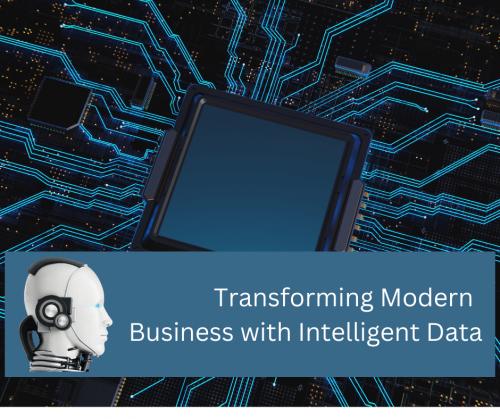Transforming Modern Business with Intelligent Data

In today's
fast-paced business landscape, data has become the cornerstone of
decision-making and strategic planning. But it's not just any data that drives
success; it's intelligent data. This article delves into how intelligent data
is transforming modern business, providing a comprehensive overview of its
benefits, implementation strategies, tools, challenges, and future trends.
Understanding Intelligent Data
Definition of Intelligent Data
Intelligent
data is more than just raw information; it's data that has been processed,
analyzed, and contextualized to provide actionable insights. It leverages advanced
technologies such as artificial intelligence (AI) and machine learning (ML) to
go beyond traditional data analysis, enabling businesses to make informed
decisions.
Key Characteristics of Intelligent
Data
- Accuracy: Ensures data is free from
errors and inconsistencies.
- Relevance: Provides information that is
pertinent to the specific needs of the business.
- Timeliness: Offers up-to-date information
that reflects current conditions.
- Actionability: Translates into clear,
actionable insights.
Benefits of Intelligent Data in Business
Enhanced Decision Making
Intelligent
data empowers businesses to make data-driven decisions with greater confidence.
By providing accurate and relevant insights, it allows for more strategic
planning and effective problem-solving.
Improved Customer Experience
With
intelligent data, companies can gain a deeper understanding of customer
behaviors and preferences. This leads to more personalized marketing efforts,
improved customer service, and ultimately, higher customer satisfaction.
Increased Operational Efficiency
By
optimizing various processes, intelligent data helps in reducing operational
costs and increasing productivity. It enables businesses to identify
inefficiencies and streamline their operations for better performance.
The Role of AI and Machine Learning
AI in Data Processing
AI plays a
crucial role in processing large volumes of data quickly and accurately. It
automates repetitive tasks, identifies patterns, and extracts meaningful
insights, all of which are vital for intelligent data.
Machine Learning for Predictive Analysis
Machine
learning algorithms can predict future trends based on historical data. This
predictive analysis is invaluable for businesses looking to stay ahead of the
competition by anticipating market changes and customer needs.
The role of IoT Data Analytics
IoT data
analytics
revolutionizes modern business by providing real-time insights from connected
devices. This technology enhances decision-making, improves operational
efficiency, and enables predictive maintenance. By leveraging IoT data,
businesses can optimize processes, reduce costs, and deliver personalized customer
experiences, leading to a competitive edge in the market.
Implementing Intelligent Data Strategies
Data Collection Methods
Collecting
high-quality data is the first step in leveraging intelligent data. This can be
done through various means such as surveys, sensors, social media, and
transactional records.
Data Integration Techniques
Integrating
data from multiple sources ensures a comprehensive view of the business
environment. Techniques like data warehousing and ETL (Extract, Transform,
Load) processes are commonly used.
Ensuring Data Quality
Maintaining
data quality is critical. This involves regular cleaning, validation, and
updating of data to prevent errors and ensure reliability.
Tools and Technologies
Popular Intelligent Data Tools
Some of the
most widely used tools for intelligent data include:
- Tableau: For data visualization
- SAS: For advanced analytics
- Google Analytics: For web analytics
- Microsoft Power BI: For business intelligence
Emerging Technologies
Emerging
technologies such as blockchain, IoT (Internet of Things), and quantum
computing are poised to further enhance the capabilities of intelligent data.
Challenges and Solutions
Common Challenges in Adopting
Intelligent Data
- Data Privacy Concerns: Ensuring customer data is
protected.
- Integration Issues: Combining data from diverse
sources can be complex.
- High Costs: Implementing advanced
technologies can be expensive.
Solutions and Best Practices
- Data Governance Policies: Establish clear guidelines for
data usage.
- Advanced Integration Platforms: Use tools designed for
seamless data integration.
- Cost-Benefit Analysis: Assess the ROI of intelligent
data initiatives to justify expenses.
Case Studies
Success Stories of Businesses Using
Intelligent Data
- Amazon: Uses intelligent data for
personalized recommendations, significantly boosting sales.
- Netflix: Leverages data to understand
viewer preferences and create hit shows.
- Walmart: Utilizes data to optimize
supply chain management, reducing costs and improving efficiency.
Lessons Learned
These
companies demonstrate the importance of investing in intelligent data and
continuously refining data strategies to stay competitive.
Future Trends in Intelligent Data
The Evolution of Intelligent Data
As
technology advances, intelligent data will become even more integral to
business operations. We can expect more sophisticated AI algorithms and
improved data processing capabilities.
Predictions for the Future
- Increased Automation: More tasks will be automated,
freeing up human resources for strategic activities.
- Enhanced Personalization: Businesses will be able to
offer even more tailored experiences to customers.
- Greater Data Accessibility: Improved tools will make it
easier for non-experts to leverage intelligent data.
Conclusion
Intelligent
data is revolutionizing the way businesses operate, offering unprecedented
insights and efficiencies. By embracing intelligent data, companies can make
better decisions, enhance customer experiences, and stay ahead of the
competition. As we look to the future, the potential of intelligent data is
limitless.
Are you
aiming for a career in Business Intelligence? Enroll in a Data Analytics & Business
Intelligence Bootcamp to pave your way to success in this field.
Comments